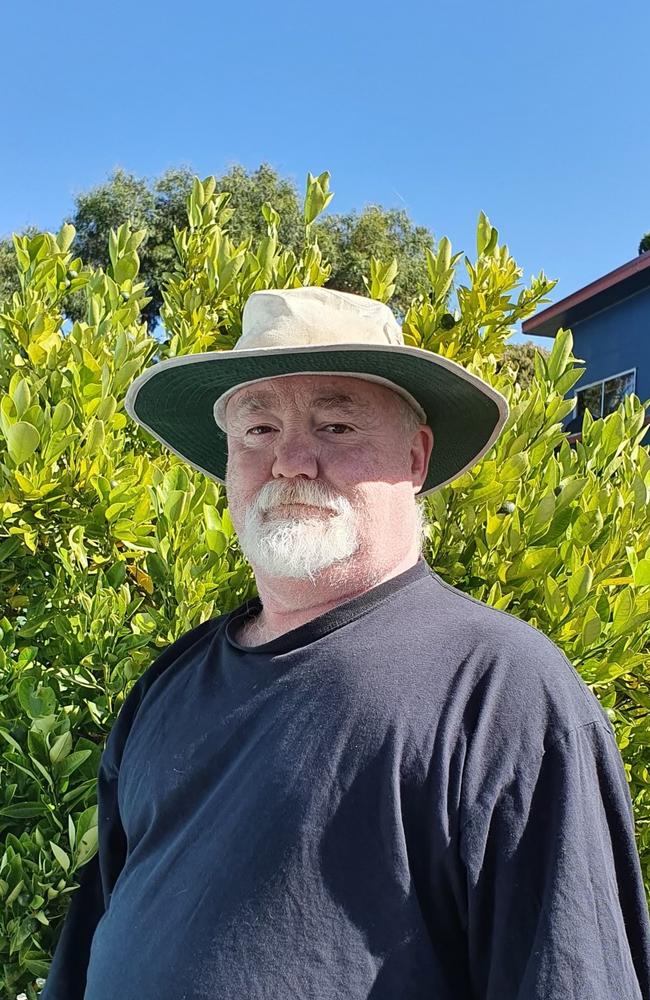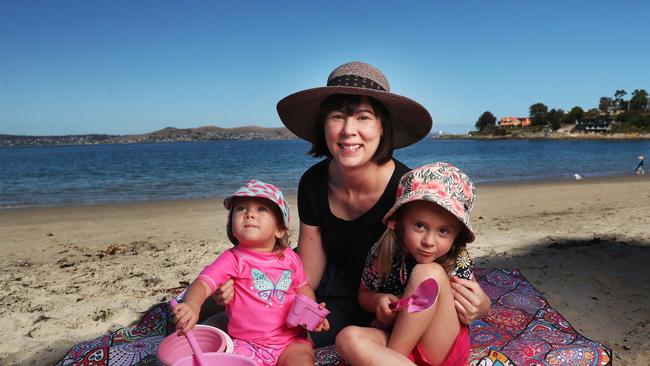‘Incredibly lucky’: Health scare sparks man’s mission for sun safety
A Tasmanian man that was told he only had months to live is on a mission to save others from a form of cancer that kills one Australian every six hours. HIS STORY + HOW YOU CAN HELP >>
Tasmania
Don't miss out on the headlines from Tasmania. Followed categories will be added to My News.
Nearly 10 years ago, Ken Harriss was told he had months to live and the only treatment for his melanoma was palliative care.
“I’ve still got the letter that tells me my life expectancy was measured in months, my case was terminal and the only treatment for me was palliative care,” the 55-year-old nurse said.
“The melanoma I was diagnosed with in 2012 came back in my chest 11 months later and it was near my heart, so surgery was not possible and they said chemotherapy would be unsuccessful and radiation wouldn’t work.”
Mr Harriss was diagnosed in 2012 with Stage 3 melanoma which resulted in surgery to remove his lymph nodes.
In his youth he was a surfer and enjoyed family holidays at the beach.
He went to the doctor after noticing a lump on his neck.

His only option was to go the Peter MacCallum Cancer Centre in Melbourne where he was placed on an immunotherapy clinical trial.
Every two weeks for four years Mr Harriss went to Melbourne for treatment.
“I was absolutely exhausted but it wasn’t as bad as chemo,” he said.
“The drugs make your immune system identify cancer cells and then your immune system takes care of the cancer.
“It is amazing stuff.”
Without the immunotherapy he would never have met his two young granddaughters aged nine and four.
Mr Harriss has since started an awareness campaign Run from the Sun, visiting schools on his beloved motorcycle and speaking to thousands of students about melanoma and sun safety.
“No matter how old you are, prevention is always the best option,” he said.

‘People are still so complacent around their skin.”
Mr Harriss will take part in Hobart’s first Melanoma March in Hobart on Sunday to raise funds for research.
“Melanoma March is so important in raising awareness for melanoma and important funds for research so we can find answers to this terrible disease that continues to take lives.
“I have friends and acquaintances I’ve met along the way who are no longer with us and others who still have melanoma so I will be remembering them.
“I was incredibly lucky.”
Someone new diagnosed every 30 minutes
ONE Australian dies from melanoma every six hours and it is the most common cancer affecting people aged 20 to 29, the Melanoma Institute Australia says.
MIA is urging Tasmanians to take part in Melanoma March on Sunday to raise $1.5m for research.
It is the 11th anniversary of the fundraising march and money raised this year will help support a world-first personalised immunotherapy clinical trial for advanced melanoma patients.
MIA chief executive Matthew Browne said Australia had the highest melanoma rates in the world with one person diagnosed with the disease, on average, every 30 minutes.
Mr Browne said because of Covid, the national fundraising march had been cancelled for the past two years.
“Not only did the Covid cancellations mean we couldn’t gather to support each other and remember loved ones, but we also were left with a $1.5m fundraising shortfall,” he said.

“So this year’s campaign is critical to ensure the world-first personalised immunotherapy clinical trial can get underway, which has the potential to transform cancer treatment globally.”
“Currently, 50 per cent of advanced melanoma patients don’t respond to, or develop resistance to the immunotherapy treatment which saves others.
“The clinical trial is to test a Personalised Immunotherapy Platform designed to ensure these patients get effective treatment the first time, based on their own genetics and tumour biology.”
Skin Cancer Tasmania founder and chair Di Mason said the latest Tasmanian figures from 2018 showed 205 men and 200 women were diagnosed with melanoma but that did not count early forms of the disease.
She said skin checks were not covered by a Medicare item number so many Tasmanians did not prioritise as part of their annual health check-ups.
“We know that early detection saves lives,” Ms Mason said.
“Skin Cancer Tasmania would like to see more general practitioners trained in dermoscopy to ensure all Tasmanians have equal access to these lifesaving checks.
“Tasmania is one of the few states that does not have a dedicated melanoma unit so it is vital that all of our health practitioners work together to ensure the best outcome for our community.”
“This is currently occurring in some sectors but we would like to see dedicated multidisciplinary meetings for melanoma and skin cancer occurring at all the major hospitals across Tasmania.”
Ms Mason said people who had a diagnosis of metastatic melanoma 10 years ago, “almost certainly did not live five years past diagnosis”.
“Now with the important and life-saving work that MIA has done with immunotherapy trials, we are now seeing many more people with a Stage IV diagnosis either living longer, or seeing the disease disappear, or receiving a diagnosis of No Evidence of Disease - NED.”
Ms Mason said the best prevention against melanoma was for people to protect themselves against harmful UV rays and to get their skin checked annually.





